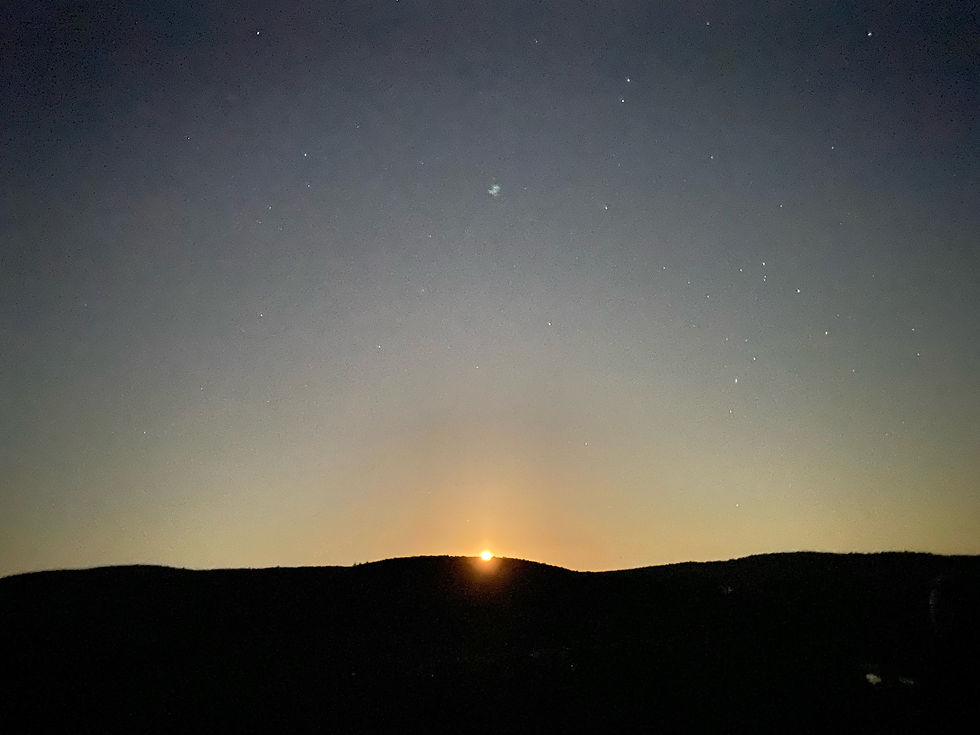Strawberry Moon Rise
- Todd DeGarmo
- Jun 17, 2022
- 2 min read

We saw the Strawberry Moon rise over Eldridge Swamp two nights ago. Just south of our home in Shushan, New York. At a place we had never visited. Nor knew of its existence. No interfering lights. No one else nearby. No other sounds. Only the chorus of frogs encouraging the moon's performance.
Thanks to our friend Jack Metzger for sharing the moving experience. He called out-of-the-blue that evening with a secret surprise. If we were willing, grab a sweatshirt and water shoes, and follow him to an undisclosed location. He then led us by kayak on a tour through the swamp to the beaver dam, in the dusk of sunset, entreating us to wait at a previously unknown rustic cabin retreat, for the full moon to rise.
Eldridge Swamp is privately and publicly owned wetlands in Washington County just south of the Battenkill. This unique swamp forest is a rare boreal ecosystem, with the southernmost population of white spruce in New York. It is also an important wildlife habitat, including deer, beaver, song birds, owls, raccoon, fisher and porcupine. The public lands are open for year-round recreation.
The Strawberry Moon was named by northeastern and eastern Canadian Native American cultures for the full moon during strawberry harvest in June. This year of 2022, a so-called Super Moon is expected due to the Moon's close distance to the Earth.
Here's a poem that came to mind while viewing the moon rise with Jack and Nancy. It is based on a legend and belief by many Native American cultures that each of the thirteens moons of the year has its own story connecting it to the Earth and its seasons. It comes to us by a beautiful collaboration between local Abenaki storyteller Joseph Bruchac and poet Jonathan London, and found in their book (illustrated by Thomas Locker), Thirteen Moons on Turtle's Back: A Native American Year of Moons (Philomel Books, NY, 1992):

Strawberry Moon
In late spring
a small boy
whose parents had died
went hunting game
down by the river
where Jo-ge-oh,
the Little People who care
for the plants, live.
He shared what he caught
with those Little People.
In return they took him
in a magic canoe
up into the cliffs,
taught him many things
and gave him strawberries.
He was gone just four days,
but when he returned
years had passed
and he was a tall man.
He shared with his people
what he was taught and
gave them the sweetness
of red strawberries.
So each year, the Senecas
sing songs of praise
to the Little People,
thanking them again
for this moon's gift.

What wonderful reminders of the natural beauty, local legends, and bountiful harvest of our upper Hudson Valley region!
Todd DeGarmo is the founding director of The Folklife Center at Crandall Public Library, in Glens Falls, NY, and can be reached at tdegarmo@sals.edu. He’s worked as a public sector folklorist and educator in various venues for over 42 years, and is the editor of Voices: Journal of New York Folklore. He lives in the upper Hudson Valley of upstate New York, a stone’s throw from the Battenkill near the Vermont border.





Comentarios